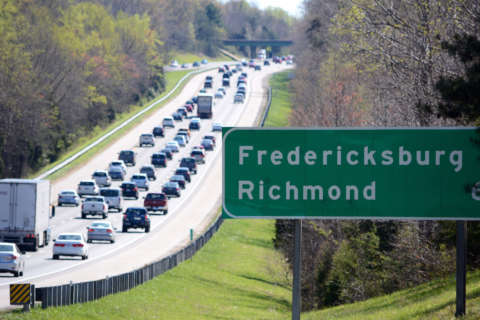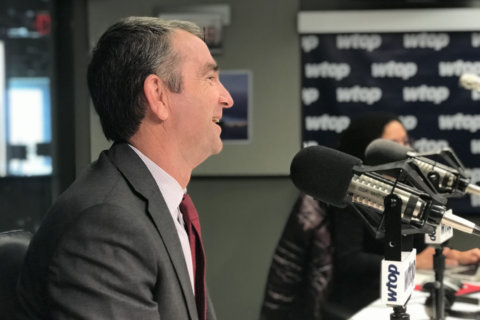WASHINGTON — Virginia Gov. Ralph Northam on Wednesday again celebrated the announcement of four road-construction projects totaling $1 billion, saying that the new highway lanes will help relieve some of Northern Virginia’s worst traffic bottlenecks.
“This is over a billion dollars, with a B, of investment in just these four projects. This is a real step in the right direction,” Northam said on WTOP’s Ask the Governor program.
Northam recounted the projects announced in conjunction with private partner Transurban — an extension of the 495 Express Lanes north to the American Legion Bridge; a reversible ramp connecting the 95 Express Lanes at Opitz Boulevard, and the finalization of a 10-mile extension of the 95 Express Lanes to Fredericksburg.
Transurban will pay for those projects; the state will also build, on its own dime, a southbound auxiliary lane on I-95 in Woodbridge to connect the connect the southbound Virginia Route 123 ramp to I-95 with the offramp at westbound Prince William Parkway. It’ll be paid for in what Northam’s office characterized as “project savings” and won’t require any new tax money.
It was pointed out to Northam that the extension of the lanes to the American Legion Bridge might simply move the bottleneck into Maryland, and asked whether the move would put pressure on Maryland to add lanes on their side, Northam said, “I hope it does.”
He cited his good relationship with Maryland Gov. Larry Hogan, Northam said Maryland officials realize “this is a bottleneck that we need to open. … We feel like we’re doing our share on the Virginia side, and we hope to work with them.”
He added, “You can bring all the lanes you want to the bridge, but unless you expand the bridge you’re going to have the same kinds of problems.”
The Occoquan auxiliary lane opened up what the governor called “a tremendous bottleneck,” and could be seen as a move that would take traffic away from Transurban’s toll lanes, so the company thought it was “a compensation issue,” Northam said. The state disagreed, but “we decided this is not something we wanted to argue or discuss for the next 69 years,” Northam said.
The governor characterized the new road construction as part of an “all of the above” transportation policy, including roads, transit and more.
“Our goal all along has been to move people and move goods as effectively and efficiently as we can,” Northam said.
Teacher pay
This week, Virginia teachers demonstrated in the streets of Richmond for higher pay and more money for education. One estimate says spending by Virginia is down about 9 percent in the past decade, and teacher pay in Virginia ranks 34th in the nation.
Northam, who teaches at the Eastern Virginia Medical School, said he and his wife, a former high school and elementary science teacher, were out among the teachers. “We teach because we love what we’re doing — we love children,” Northam said. “But we have bills to pay, and our teachers do as well.”
“If we’re going to recruit and retain talented teachers,” he said, “we have to pay them.”
A 3 percent pay raise for Virginia teachers is set to go into effect in July. Northam has proposed bumping that raise to 5 percent. While Republicans in the General Assembly broadly agree with the goal, the two sides have different ideas on how to pay for it.
The tax bill pushed by President Donald Trump and passed last year will result in an increase in tax revenues in Virginia; combined with other measures such as the internet sales tax, Northam said, Virginia tax revenues last October were up 10 percent over the previous year. “Our revenues in Virginia are doing very well,” the governor said.
The Republicans in the Virginia House of Delegates say that Northam’s plan will require a tax increase, while theirs won’t. The governor argued that their numbers don’t add up, but said “My door is open. I am willing to sit and talk about how we move forward,” but said the legislative session was almost halfway over “and people haven’t even started talking about the budget.”
The Virginia Education Association has said enrollment in teacher prep programs is down 40 percent in the last decade. “This should be a nonpartisan issue,” Northam added. “The education of our children is important. They are our future.”
Shutdown impact
Northam had sharp words about the effects of the federal government shutdown, which lasted 35 days and ended last week.
President Trump shut the government down after Congress wouldn’t approve $5.7 billion for his proposed wall on the southern border, and has said he’ll shut the government down when the current deal expires Feb. 15 if he doesn’t get the money.
Northam said that 130,000 federal workers live in Virginia, and that roughly half of them didn’t get paid during the shutdown. They were “used as pawns,” Northam said, as were the contractors who won’t be getting back pay. “No excuse. For no good reason.”
He said of the administration, “They’re talking about border security, and I get it,” but among the agencies where workers were furloughed were the Department of Homeland Security, including the Coast Guard. “If you want to talk about security, that’s where a lot of bad things happen.”
Private and local efforts to help furloughed feds and contractors popped up across the area, which Northam called “a good example of what we are as Americans.” But as the shutdown cost Virginia millions of dollars in tax revenue per week, Northam said the question for states is “How much of a financial burden can we take?”
His message to the president and Congress was, “do not use fellow Americans as pawns when you have disagreements.” Reacting to word that Trump recently estimated the likelihood of another shutdown as better than 50-50, he said “We as Americans shouldn’t tolerate that and I hope we don’t have to experience it again.”
Late-term abortion
Northam said the controversy regarding made by Del. Kathy Tran on her late-term abortion bill was “overblown.”
Tran acknowledged during a hearing that her bill would allow abortions up until moments before birth. But existing state law already provides for abortions throughout the third trimester, if three doctors certify a woman’s health would otherwise be substantially and irremediably impaired.
Tran’s bill would reduce the number of doctors required to certify late-term abortions from three to one. It also would delete the words “substantially and irremediably” when referring to the threat that continuing a pregnancy poses for impairing a woman’s health.
“I wasn’t there and I certainly can’t speak for Delegate Tran,” Northam said, but he added, “This is why decisions should be made by providers, physicians, mothers and fathers.”
Northam, a doctor, said that such procedures happen “where there may be severe deformities [or] a fetus that’s nonviable.”
He explained, “The infant would be delivered; the infant would be kept comfortable; the infant would be resuscitated if that’s what the mother and the family desire, and then a discussion would ensue between the physicians and the mother.”
Northam added, “This is why legislators, most of whom are men, by the way, shouldn’t be telling a woman what she should and shouldn’t be doing with her body. … We want the government not to be involved in these types of decisions.”
He said that he would still support the notion of requiring certification from more than one doctor: “I think it’s always good to get a second opinion.”
Guns
Northam reiterated his opposition to a Senate bill allowing guns in places of worship, saying, “This whole proliferation of guns is not the direction I would want to see Virginia go in.”
The governor’s favored gun-control measures all failed in the General Assembly, but he continued to support reforms. He noted that 1,028 Virginians died from gunfire last year, and that a number of them resulted from suicides, accidents involving children and domestic abuse. All told, he said, that was more than died on the commonwealth’s roads, and yet discussion and adjustment of laws regarding traffic safety is considered a normal part of governance.
While his favored bills failed, Northam said, “We have an election this November, and I would hope some like-minded people come to Richmond.”
Tobacco and marijuana
Virginia raised its age for tobacco from 18 to 21, and Northam said the tobacco industry recognized the problems posed by young smokers and vapers.
“The tobacco industry realizes that ware have a problem in high school,” Northam said, adding that 18-year-olds can buy tobacco and give it to children. “They see it as a problem,” he said of the tobacco companies, and said moving up the tobacco age will help to alleviate that.
“Virginia is a low-tax state, but I would be more than willing” to have a discussion on raising tobacco taxes, Northam said, noting that, “you and I end up paying” for medical care for smokers.
The governor also restated his support for decriminalization — though not legalization — of marijuana, so that studies could be done on its effects in the interest of “evidence-based medicine.”
“We’re … ruining the lives” of people who are “not dangerous to our society,” Northam said.
The Associated Press contributed to this report.








